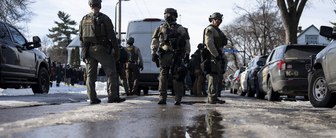President Donald Trump has said that major US cities are dangerous and unruly.
“Look at what happened in New York, look what happened in Chicago. All Democrats. All radical left Democrats,” he said during a recent address. In a September 8 tweet, he wrote, “Suburban voters are pouring into the Republican Party because of the violence in Democrat run cities and states. If Biden gets in, this violence is ‘coming to the Suburbs’, and FAST. You could say goodbye to your American Dream!”
It seems many Americans are listening to the president about the big city’s threats. New data from an Economist/YouGov poll finds that most Americans (68%) say that they would feel unsafe if they lived in a large city.
About one-third (32%) say they would feel “not very safe”, and 36 percent say they would feel “not safe at all” if they lived in a city like New York, Chicago, or Los Angeles. Americans who live in rural areas (77%) and towns (72%) are particularly likely to say that they would feel unsafe living in a large city.
Even city-dwellers aren’t sure about the safety of large cities. Most (58%) say they would feel unsafe living in a large city, while 43 percent say they would feel safe.
However, additional Economist/YouGov polling finds that most Americans – including those who live in cities – generally feel safe in their own neighborhoods. About nine in 10 (89%) people say they feel very safe or somewhat safe in their neighborhoods.
Those who live in rural areas (46%) and towns (46%) are more likely than those living in suburbs (40%) or cities (28%) to say they feel “very safe” in their neighborhood.
See the toplines and crosstabs from this week’s Economist/YouGov Poll
Methodology: The Economist survey was conducted by YouGov using a nationally representative sample of 1,500 U.S. adult citizens interviewed online between August 30 - September 1, 2020. This sample was weighted according to gender, age, race, and education based on the American Community Survey, conducted by the US Bureau of the Census, as well as 2016 Presidential vote, registration status, geographic region, and news interest. Respondents were selected from YouGov’s opt-in panel to be representative of all US citizens. The margin of error is approximately 3.5% for the overall sample.
Image: Getty











